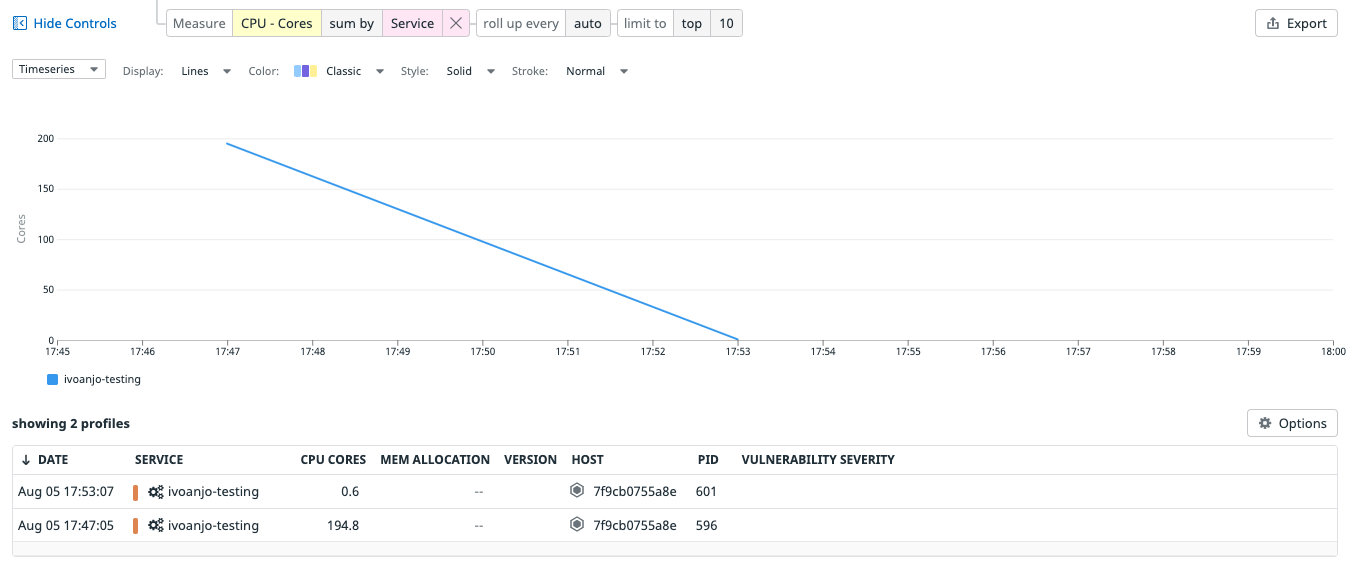-
Notifications
You must be signed in to change notification settings - Fork 369
New issue
Have a question about this project? Sign up for a free GitHub account to open an issue and contact its maintainers and the community.
By clicking “Sign up for GitHub”, you agree to our terms of service and privacy statement. We’ll occasionally send you account related emails.
Already on GitHub? Sign in to your account
[PROF-3321] Fix CPU-time accounting when fibers are used #1636
Conversation
Since this method is being called at stack sampler startup, threads that previously were not touched were going to get written to anyway on the next sample. The one exception/behavior change is if cpu time profiling is disabled or unavalable for some reason -- we would previously never set the `THREAD_LAST_CPU_TIME_KEY` for threads in that case, but I don't think it's worth having this distinction, so I'll take the simpler implementation and tests instead.
The Ruby `Thread` API has a really sharp edge around `Thread#[]` and `Thread#[]=`: these methods are "not thread-local but fiber-local". The documentation even goes as far as calling this "a confusion", see <https://rubyapi.org/3.0/o/thread#method-i-5B-5D>. Our CPU-time tracking was suffering from this confusion. Because it was using `Thread#[]`/`Thread#[]=`, if a thread switched between fibers, our CPU-time tracking started miscounting time. E.g., consider the following test application: ```ruby def fake_cpu_time(n) Thread.pass sleep 0.01 Thread.pass puts "Fiber #{n} yielding..." Fiber.yield :frozen puts "Fiber #{n} resumed..." Thread.pass sleep 0.005 Thread.pass sleep 0.005 Thread.pass end def start_fibers fibers = (0..1000).map do |n| Fiber.new do fake_cpu_time(n) end end run_fibers(fibers) fibers end def actually_do_cpu_work puts "Starting cpu work" start = Time.now nil while Time.now < (start + 28) puts "Finished cpu work..." end def run_fibers(the_fibers) the_fibers.each(&:resume) end the_fibers = start_fibers actually_do_cpu_work run_fibers(the_fibers) ``` The following happens in this example: 1. It starts 1000 fibers, using `Thread.pass`+`sleep` to try to give the profiler a chance to run and sample them. 2. Because `Thread#[]=` is fiber-local, every fiber that is sampled gets its own copy of `THREAD_LAST_CPU_TIME_KEY` 3. Then the example switches back to the original fiber, and does some CPU-heavy work for around 28 seconds 4. The example app then runs through every fiber again, using `Thread.pass`+`sleep` to give the profiler a chance to sample every fiber. 5. While sampling, the profiler will observe that the current cpu time for on every fiber has advanced 28 seconds from the last value stored in the `THREAD_LAST_CPU_TIME_KEY` 6. Profiler will report that the same thread will have spent hours of CPU time in a 1-minute period. (In my experiment, it reported close to 2 hours, 40 minutes). The fix here is simple: switch to using the `Thread#thread_variable_get` and `Thread#thread_variable_set` APIs, which give us the intended behavior: even across multiple fibers, we just keep a single value for the same thread, and thus we get the expected ~28s of cpu-time in the test application.
Codecov Report
@@ Coverage Diff @@
## master #1636 +/- ##
==========================================
- Coverage 98.30% 98.30% -0.01%
==========================================
Files 901 901
Lines 43541 43532 -9
==========================================
- Hits 42805 42796 -9
Misses 736 736
Continue to review full report at Codecov.
|
There was a problem hiding this comment.
Choose a reason for hiding this comment
The reason will be displayed to describe this comment to others. Learn more.
Nice catch, we'll likely have to do similar analysis for the tracer as well.
This analysis is on our radar, specially because newer releases of graphql use fiber, and we know there's an impact with the tracer's current implementation. (Doesn't mean we can just flip it to thread_variable_* without due diligence 😅)
|
Yeah, for the tracer it's actually non-trivial as we may actually want a mix of fiber-local and thread-local. For instance, "current span" probably makes sense to be fiber-local -- if I start a span in a fiber, and then switch fibers, I should probably not be inside the same span. |
|
It occurred to me that this was a really simple change, but the resulting performance impact may be non-trivial, so I wrote up a quick benchmark, which I tested on require 'benchmark/ips'
OTHER_THREAD = Thread.new { sleep }
Benchmark.ips do |x|
x.config(:time => 5, :warmup => 2)
x.report("fiber-local-set") { OTHER_THREAD[:foo] = 1}
x.report("thread-local-set") { OTHER_THREAD.thread_variable_set(:foo, 1) }
x.compare!
end
Benchmark.ips do |x|
x.config(:time => 5, :warmup => 2)
x.report("fiber-local-get-non-existing") { OTHER_THREAD[:non_existing] }
x.report("thread-local-get-non-existing") { OTHER_THREAD.thread_variable_get(:non_existing) }
x.compare!
end
Benchmark.ips do |x|
x.config(:time => 5, :warmup => 2)
x.report("fiber-local-get-existing") { OTHER_THREAD[:foo] + 1 }
x.report("thread-local-get-existing") { OTHER_THREAD.thread_variable_get(:foo) + 1 }
x.compare!
endand indeed there is a performance difference! on the other hand, we're still talking many millions per second, so I'm confident this will not have a noticeable impact (we do way more expensive things in the sampling loop). |

The Ruby
ThreadAPI has a really sharp edge aroundThread#[]andThread#[]=: these methods are "not thread-local but fiber-local".The documentation even goes as far as calling this "a confusion", see https://rubyapi.org/3.0/o/thread#method-i-5B-5D.
Our CPU-time tracking was suffering from this confusion. Because it was using
Thread#[]/Thread#[]=, if a thread switched between fibers, our CPU-time tracking started miscounting time.E.g., consider the following test application:
The following happens in this example:
Thread.pass+sleepto try to give the profiler a chance to run and sample them.Thread#[]=is fiber-local, every fiber that is sampled gets its own copy ofTHREAD_LAST_CPU_TIME_KEYThread.pass+sleepto give the profiler a chance to sample every fiber.THREAD_LAST_CPU_TIME_KEYThe fix here is simple: switch to using the
Thread#thread_variable_getandThread#thread_variable_setAPIs, which give us the intended behavior: even across multiple fibers, we just keep a single value for the same thread, and thus we get theexpected ~28s of cpu-time in the test application.